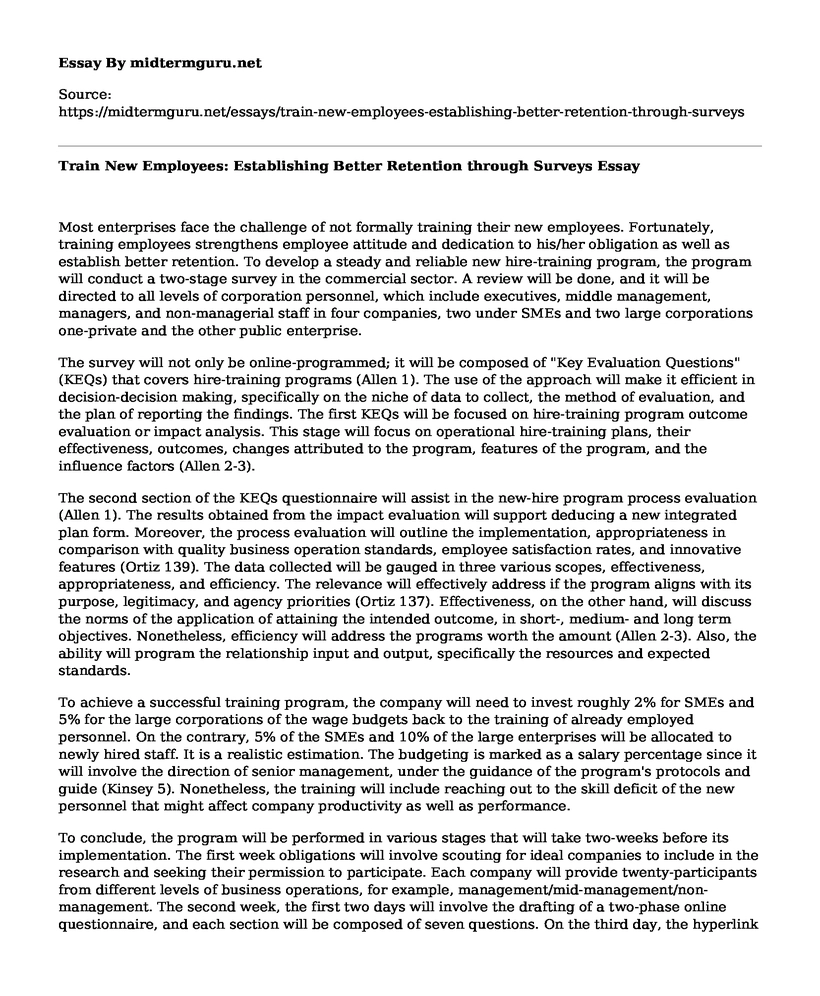Most enterprises face the challenge of not formally training their new employees. Fortunately, training employees strengthens employee attitude and dedication to his/her obligation as well as establish better retention. To develop a steady and reliable new hire-training program, the program will conduct a two-stage survey in the commercial sector. A review will be done, and it will be directed to all levels of corporation personnel, which include executives, middle management, managers, and non-managerial staff in four companies, two under SMEs and two large corporations one-private and the other public enterprise.
The survey will not only be online-programmed; it will be composed of "Key Evaluation Questions" (KEQs) that covers hire-training programs (Allen 1). The use of the approach will make it efficient in decision-decision making, specifically on the niche of data to collect, the method of evaluation, and the plan of reporting the findings. The first KEQs will be focused on hire-training program outcome evaluation or impact analysis. This stage will focus on operational hire-training plans, their effectiveness, outcomes, changes attributed to the program, features of the program, and the influence factors (Allen 2-3).
The second section of the KEQs questionnaire will assist in the new-hire program process evaluation (Allen 1). The results obtained from the impact evaluation will support deducing a new integrated plan form. Moreover, the process evaluation will outline the implementation, appropriateness in comparison with quality business operation standards, employee satisfaction rates, and innovative features (Ortiz 139). The data collected will be gauged in three various scopes, effectiveness, appropriateness, and efficiency. The relevance will effectively address if the program aligns with its purpose, legitimacy, and agency priorities (Ortiz 137). Effectiveness, on the other hand, will discuss the norms of the application of attaining the intended outcome, in short-, medium- and long term objectives. Nonetheless, efficiency will address the programs worth the amount (Allen 2-3). Also, the ability will program the relationship input and output, specifically the resources and expected standards.
To achieve a successful training program, the company will need to invest roughly 2% for SMEs and 5% for the large corporations of the wage budgets back to the training of already employed personnel. On the contrary, 5% of the SMEs and 10% of the large enterprises will be allocated to newly hired staff. It is a realistic estimation. The budgeting is marked as a salary percentage since it will involve the direction of senior management, under the guidance of the program's protocols and guide (Kinsey 5). Nonetheless, the training will include reaching out to the skill deficit of the new personnel that might affect company productivity as well as performance.
To conclude, the program will be performed in various stages that will take two-weeks before its implementation. The first week obligations will involve scouting for ideal companies to include in the research and seeking their permission to participate. Each company will provide twenty-participants from different levels of business operations, for example, management/mid-management/non-management. The second week, the first two days will involve the drafting of a two-phase online questionnaire, and each section will be composed of seven questions. On the third day, the hyperlink (URL) will then be sent to all the participants who will be given until the end of the week to participate. The data will be collected for review. The next week, evaluation and analysis will be done, while the final new-hire training program is drafted for approval.
Work Cited
Allen, Will. Key evaluation questions (KEQs). 7 October 2016. <https://learningforsustainability.net/post/key-evaluation-questions/>. Accessed on 21 September 2019
Kinsey, Anne. Training budgets step-by-step. 05 February 2019. <https://bizfluent.com/how-6568957-training-budgets-step-by-step.html>. Accessed on 21 September 2019
Ortiz, Chris A. The psychology of lean improvements: Why organizations must overcome resistance and change the culture. CRC Press, 2012.
Cite this page
Train New Employees: Establishing Better Retention through Surveys. (2023, Feb 06). Retrieved from https://midtermguru.com/essays/train-new-employees-establishing-better-retention-through-surveys
If you are the original author of this essay and no longer wish to have it published on the midtermguru.com website, please click below to request its removal:
- Discussion Questions on Healthcare Leadership Paper Example
- Essay Methods of Assessing the Risk: Chemical Hazards
- Affiliative Leadership Style - Management Essay Example
- Alignment Between Organizational Strategy and Structure - Paper Example
- Essay Sample on Applying an Ethical Decision-Making Model
- UPS: Modern Tech Improving Supply Chain, Developing Business Synergy - Essay Sample
- Nike's Ethical Dilemma: Using Image of Black Man in Campaign - Essay Sample







